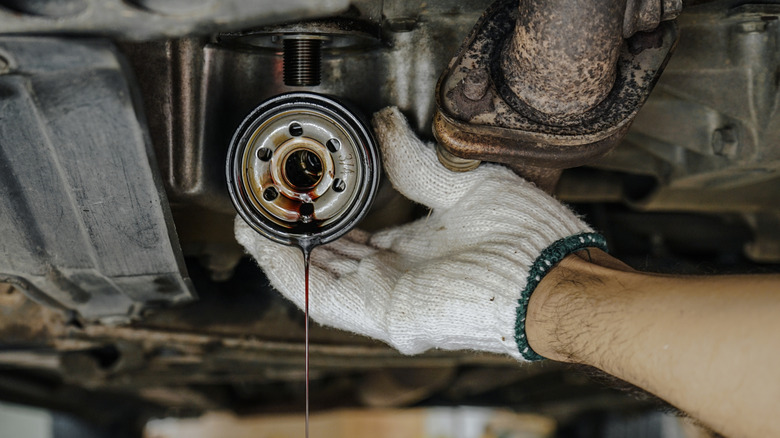These Bad Habits Might Be Shortening Your Car Oil's Lifespan
If you're like most drivers, you probably believe that keeping up with oil changes is sufficient to maintain the health of your vehicle's engine. Even with routine oil changes, some bad habits could mean your car's oil life is shortened, sometimes significantly. These sneaky car oil errors frequently go unnoticed by drivers, resulting in early oil degradation, inadequate engine protection, and needless expenses. The worst part? Many of these car oil mistakes are easy to make and even easier to overlook.
There is more to your car motor oil than just keeping the engine running smoothly. It keeps moving parts clean, inhibits corrosion, and controls temperature. However, your oil wears out more quickly and works harder when bad habits get in the way.
What are the worst habits? Things like short trips, using the incorrect oil, or forgetting to change your air filter are surprisingly common tendencies that can worsen engine oil's lifespan. We will explain some of the most frequent errors drivers make when changing their car's oil, and offer helpful advice on how to prolong its life and save some money.
Short trips and using the wrong car oil
The good news is that preventing your car's oil lifespan from shortening doesn't require much work. Premature oil breakdown can be avoided with a few simple habits. Frequent short trips or cold starts prevent your engine from reaching its optimal operating temperature and are one of the main causes of your car's oil lifespan being shortened. As a result, the oil breaks down more quickly and is less effective at protecting your engine because it contains moisture and unburned fuel.
Try to cut down on quick trips or combine errands to give your engine more time to warm up completely in order to extend the life of your oil. Take a longer drive occasionally to help burn off moisture and fuel residues that could otherwise turn to sludge and leave your car oil life shortened unnecessarily. These minor adjustments can have a significant impact on the health of your engine.
However, it's not just good driving practices that count. Making the correct oil choice is equally crucial, and drivers who do their own oil changes can make this mistake without even recognizing it. Not every oil is created equal: Using the incorrect viscosity or type can result in poor lubrication, increased engine wear over time, and faster oil degradation. Always use the type and viscosity of oil that the manufacturer recommends for the vehicle to avoid issues.
What can you do to increase your car oil's life?
It's not just about what you put into your engine when it comes to protecting your car's oil; it's also about what you keep out. Your air filter is among the simplest things to forget. Dust, dirt, and other contaminants can enter your engine through a dirty or clogged air filter, even though it may not seem directly related to your oil. Eventually, these particles enter your oil, contaminating it and speeding up its breakdown. As a result, your oil may perform worse and may not last as long if it can no longer shield important engine parts.
Develop the practice of routinely inspecting and changing your air filter in accordance with the maintenance schedule for your vehicle — or earlier if you drive in harsh or dusty conditions often. By keeping debris out of your oil, a clean filter helps your engine run smoothly and prolongs its life.
As important as it is to keep your engine clean on the inside, you should also think about how hard you're making it work on the outside. Towing beyond your vehicle's rated capacity or hauling heavy loads, for example, makes your engine and oil work harder. This increases heat production, speeds up oil deterioration, and necessitates more frequent oil changes. You can preserve your oil, extend engine life, and have dependable performance for many miles to come by adhering to your car's towing and cargo limitations as well.


